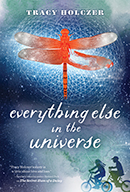Everything Else in the Universe: An Interview with Tracy Holczer
First, congratulations on your
powerful new middle grade novel, Everything
Else in the Universe. As a fellow writer who has also recently
released a middle grade novel concerned with the U. S. involvement in the war
in Vietnam, I’m delighted to talk to you a bit about your own process in
particular and about historical fiction in general.
Tell me a little bit about the book’s
premise, and how you landed on this subject.
Everything Else in the Universe is first, and foremost, a story about family
and healing. I had a disabled father, and grew up in the 70’s, so the Vietnam
era seemed a natural fit. I wanted to explore the viewpoint of a child with a
parent serving, the sacrifices made by children when their parents are sent to
war. As the novel progressed alongside the runup to the election in 2016, it
seemed important to lean more heavily on the division of feeling about Vietnam
at that time in history and the political ramifications. Not just about
protest, but of the very real conflicted feelings a child might have about
loyalty, not just with regard to patriotism, but to a parent who has suffered a
great loss while serving. To me, when stripped to that level, whether the war
was just or unjust almost became irrelevant. It became a story about a girl
trying to figure out her place in the world, but more importantly, her place in
her family.
Did you set out to write a book about the
effect of the war in Vietnam on the families of the American soldiers that
served?
I set out, primarily, to
write about one family. To shine a light on the sacrifice this country expects
not just of its military personnel, but the children in those families. I
watched films of parents returning from war and was struck by the pure relief
of the children. Wild, uncontained, relief. And I just wanted to try to capture
the whole picture. What came before and after that moment.
Could you share a bit about your research
process for the book?
I am a bit of a scatterbrain.
So, my research was all over the place. I went to San Jose, California, where
the book is set, and went through their newspaper archives for the summer of
1971, the summer Lucy and Milo became friends. I read Farmer’s Almanacs and
World Book Encyclopedias and Life Magazines. I went back to my own childhood
photos and ordered a Sears catalogue from the summer of 1971. I interviewed
Vietnam vets and heart surgeons. I also read letters from Vietnam vets to their
families. It was very surreal doing the research as history seemed to be
repeating itself.
What do you think a book like Everything Else
in the Universe offers contemporary readers, especially middle-grade
readers?
Sadly, I think our Vietnam
stories are now showing middle-grade readers that history can, and will, repeat
itself if we are not vigilant.
The writing process, especially for the novel,
is a long, hard road, and the publication of a book marks a major
achievement. As the book makes its way
into the hands of readers, what about the book or the project brings you the
greatest sense of accomplishment?
My sense of accomplishment
comes from finishing. There were times, many more than I’d like to remember,
where I was certain I wouldn’t. That this story was too much for me, and I’d
bitten off more than I could chew. But every time that happened, I took a
breath (or three), and went back to it. I look forward to talking about this
difficult process with kids. The importance of holding a goal and seeing it
through, no matter what.
Thanks so much, Tracy. Congratulations!
I'm delighted to be the first stop on Tracy's blog tour. Readers who want to learn
more about Everything Else in the
Universe can follow Tracy's blog tour here:
Mr. Schu Reads - June 17th
Kidlit Frenzy - June 18th
Teach Mentor Texts - June 20th
Caroline Starr Rose - June 22nd

Great Post Sheila. I loved hearing about your multi-faceted research process and wish you well on the book. It sounds like a winner.
ReplyDelete